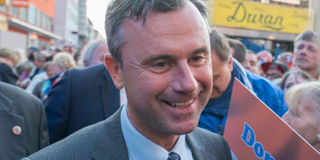Austrian far-right candidate poised to win election

Right-wing Austrian Freedom Party (FPOe) presidential candidate Norbert Hofer meets his supporters during his final election campaign rally at the Viktor Adler Markt in Vienna, Austria on May 20, 2016. Hofer’s win would also pave the way for the FPOe to head the next government after parliamentary elections, scheduled for 2018. PHOTO | AFP
What you need to know:
- In last month’s first round, Hofer—a gun enthusiast left partially disabled after a paragliding accident—comfortably beat his rival by 35 per cent to 21 per cent.
- For now, the criticism echoes through largely empty streets in Vienna, where anti-Hofer protest calls have failed to draw large crowds.
VIENNA
Austrians began voting in a key presidential runoff which could usher in EU’s first extreme right-wing leader amid the continent’s worst migrant crisis since World War II.
The vote pits 45-year-old Norbert Hofer of the anti-immigration Freedom Party (FPOe) against the Green-backed economics professor Alexander van der Bellen, 72.
A year of rising concerns about the migrant crisis and growing unemployment has left Austria deeply polarised and driven disgruntled voters away from traditional parties toward fringe groups.
In last month’s first round, Hofer—a gun enthusiast left partially disabled after a paragliding accident—comfortably beat his rival by 35 per cent to 21 per cent.
Leaning on his trademark cane, the far-right hopeful was confident of victory in his final public address.
“I will be your new president, a patron for Austria,” he told a jubilant crowd at the Viktor-Adler square in Vienna’s Favoriten district, an FPOe stronghold.
Hofer’s win would also pave the way for the FPOe to head the next government after parliamentary elections, scheduled for 2018.
Polling stations opened at 0500 GMT and the first results are expected at 1500 GMT. Final results will be announced on Monday after postal votes have been counted.
They could prove to be a tie-breaker in the race, with close to 900,000 people—or a record 14 per cent of Austria’s 6.4 million eligible voters—casting their ballot by mail this year.
Although no official surveys were released ahead of the vote, Austrian betting agencies indicated that Hofer maintained a slight lead over his opponent.
Described as the FPOe’s friendly face, Hofer has pushed populist themes with a winning smile instead of the inflammatory rhetoric used by party leader Heinz-Christian Strache.
TOUGH STANCE
The approach paid off, earning the FPOe its best result at federal level last month.
Meanwhile voters punished the two main parties, which were knocked out of the race with just 11 per cent.
The crushing defeat means that for the first time since 1945, the president will not come from the Social Democrats (SPOe) or centre-right People’s Party (OeVP).
The winner could take advantage of some of the role’s never-before-used powers, like firing the government — something Hofer has already threatened to do if the coalition fails to take a tougher line on migrants or boost the faltering economy.
European leaders, including European Commission chief Jean-Claude Juncker have voiced concern at the turn of events in Austria.
“The prospect of seeing the far-right win forces me to say that I don’t like them,” Juncker told French newspaper Le Monde on Friday.
“The Austrians don’t like to hear this but I don’t care: there is no debate or dialogue with the far-right.”
For now, the criticism echoes through largely empty streets in Vienna, where anti-Hofer protest calls have failed to draw large crowds.





